One of the cases where AI models are used is parsing raw data into a structured format. We can use an AI model to collect the data we need in web scraping without writing a parser. This is especially useful when a website updates its layout frequently. Using AI reduces the need to update the parser.
The code of this experiment is available on GitHub:
Fun fact: I started this experiment a month ago but completely forgot about it. Luckily, OpenAI announced its new feature: structured outputs, which reminded me of this project!
AI Models candidate
We are experimenting with three different AI models.
- OpenAI - gpt-4o-2024-08-06
- Gemini - gemini-1.5-flash
- Claude - claude-3-5-sonnet-20240620
- Groq (Unfortunately, didn't pass the token limitation)

Video explanation
Testing Method
We're using this page: https://books.toscrape.com/ as the target website. The goal is to get the book data in a nicely structured JSON format. We skip the fetching part and go directly to the parsing stage. So, I'm saving the raw HTML (the entire body) in a static .txt file.
During development, I'm also creating a simplified version of the HTML by adding a new .txt file that includes only the relevant data we're targeting, not the whole body tag content. This is useful to avoid using too many tokens during the development process.
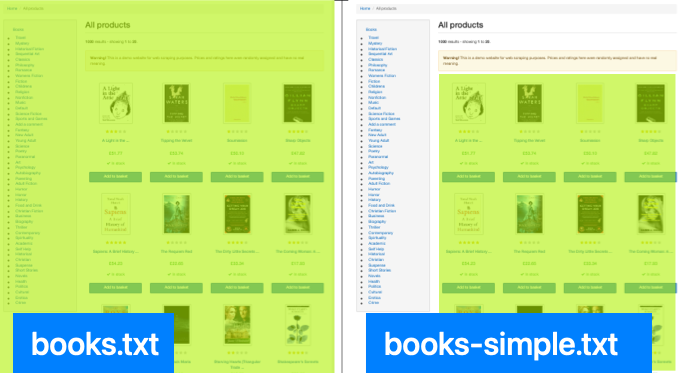
Feel free to take a look at the txt files here: https://github.com/hilmanski/web-scraping-with-ai/tree/main/data
AI models feature notes
Instead of using a regular prompt, we need to find out if the AI model has a specific feature for parsing the string. If not, we can still use a simple prompt to do the job.
OpenAI
We use OpenAI's new feature, Structured Outputs. Alternatively, we can use Function Calling.
Gemini API
Gemini has something called JSON Output. Unfortunately, I'm not able to return JSON format directly. Instead, it returns my data like this:
```json
books: {
...
}
```It includes the triple backtick and json text at the beginning. So, I need to convert it from string to JSON later on.
Claude API
Claude has a function calling feature as well. Unfortunately, during the test, I found that the usage was more complex. On top of that, using a simple prompt method works well.
Reference: Claude function calling documentation.
Important notes
Here are a few notes from the experiment:
Data Type
Defining data type is very important. For example, parsing a price could return $20.0 or just number 20. We need to define the exact format we want for consistent results.
Here is an example prompt I'm using for Claude and Gemini:
function getBooksPrompt() {
return `
Parse the HTML and collect only information about books, get all the books, not just partially.
Convert it into a JSON object with the following structure.
No explanation needed, don't response anything except the JSON object:
{
"books": [
{
"title": $title,
"link": $link,
"image": $image,
"star_rating": $star_rating, (number)
"price": $price, (number)
"in_stock": $in_stock_status, (boolean)
},
...
}
`
}Token usage
The token usage is very high compared to common usage, like asking questions or having a conversational chat with AI. Since we need to pass the whole HTML, more tokens are naturally required on the AI side.
More tokens mean more money you have to pay.
Parsing Result
Here are the results of running the parsing program ten times asynchronously for each. We're testing three things:
- the length of the item
- the first item match
- the last item match
All the data types, keys, and values must match with the reference to be considered correct.
Gemini API
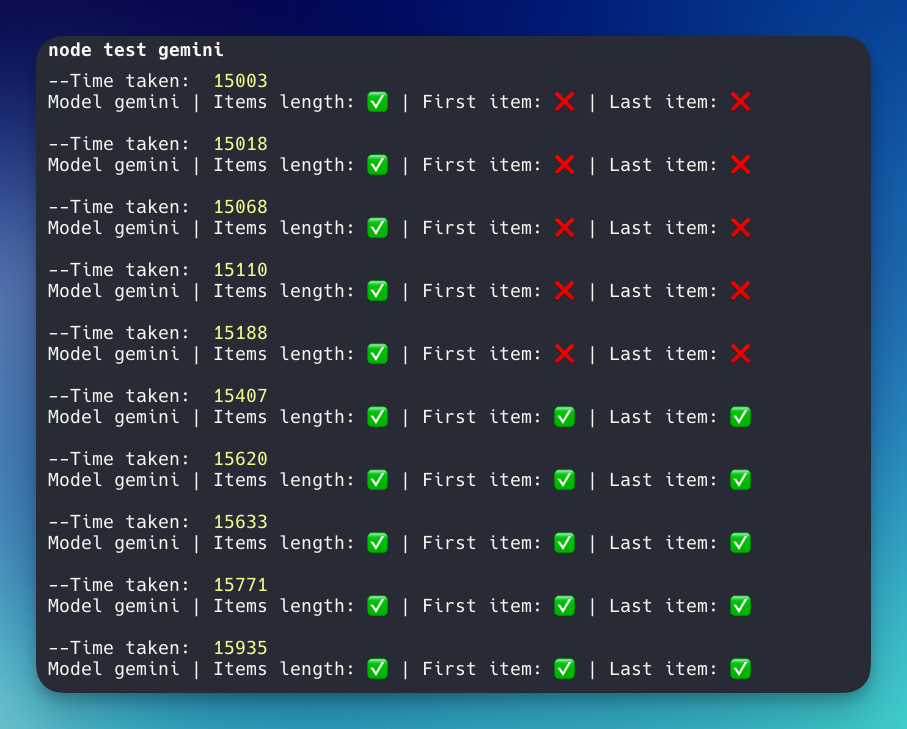
The average time taken for Gemini API is 15,375 milliseconds with 10/30 mistakes.
OpenAI API
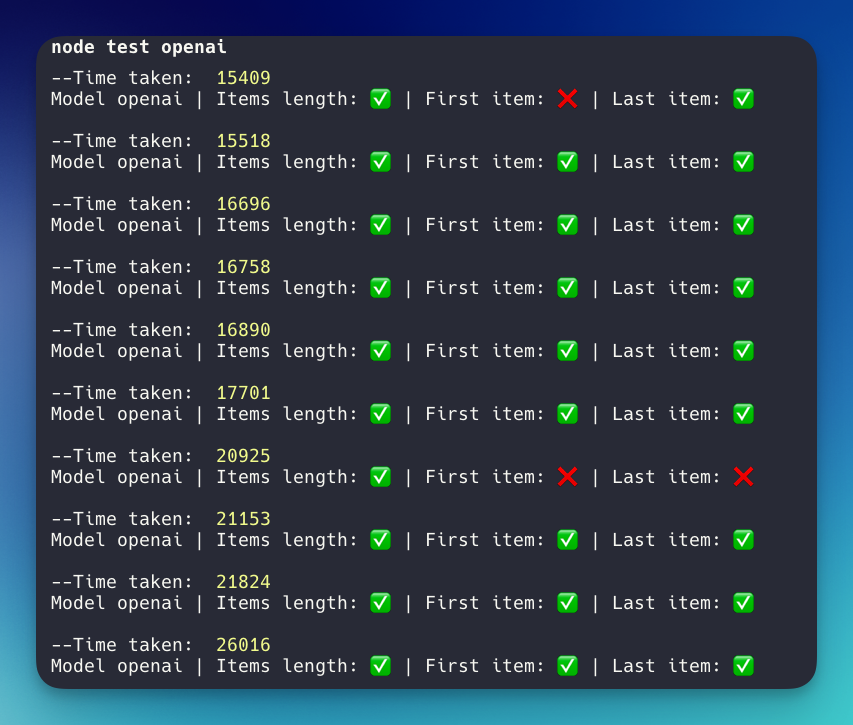
The average time taken for OpenAI is 18,889 milliseconds with 3/30 mistakes.
Claude API
I hit the per-minute rate limit error upon running the Claude API. So, I need to separate the program to run 5 times per minute. Depending on your plan purchase, you can get a higher token.
First test:
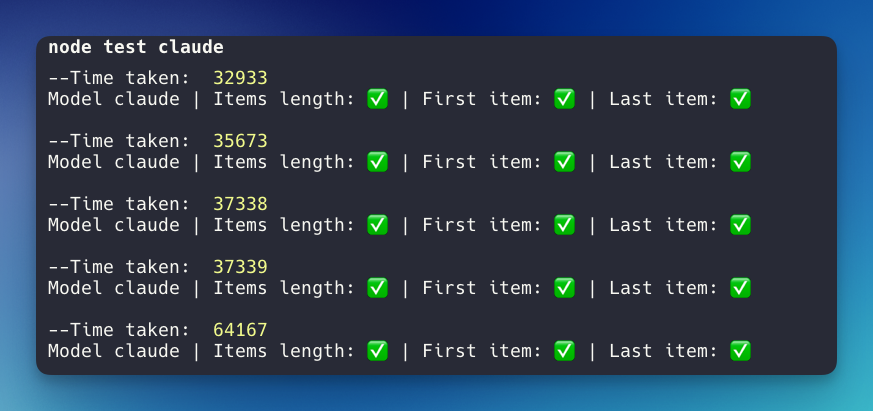
Second test:
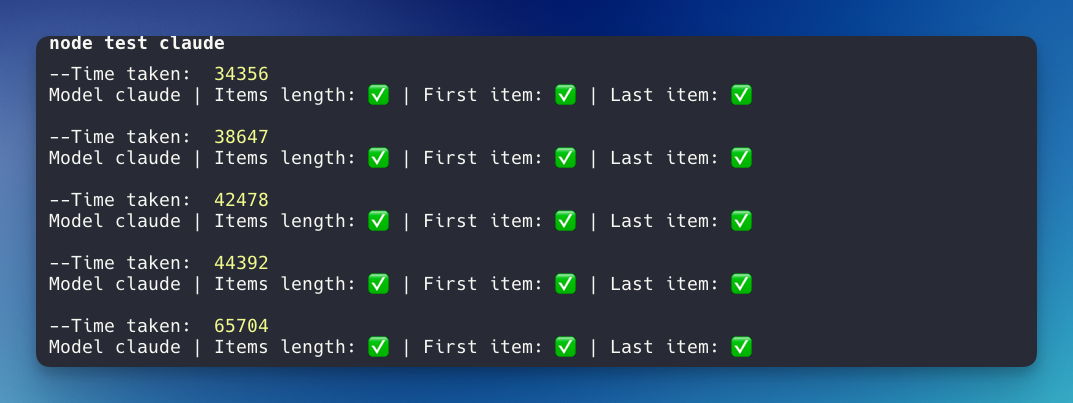
The average time taken for Claude is 43,302 milliseconds with 0/30 mistakes. 🤩🤩🤩 Perfect score!
Summary
Based on this little experiment, here is the result:
- The most accurate: Claude - claude-3-5-sonnet-20240620
- The fastest: Gemini API - gemini-1.5-flash
- Well balanced | accurate x speed | : OpenAI - gpt-4o-2024-08-06
Feel free to use the code base as a reference or the base layout for your project. I suggest trying different models to determine which is best for your use case.
